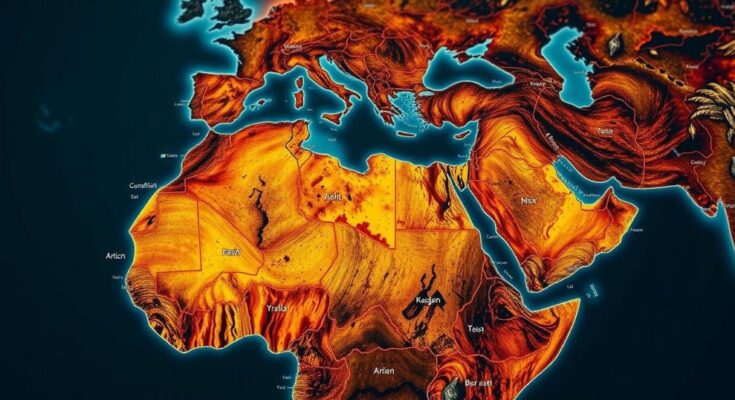Tensions in the Horn of Africa are escalating as Egypt, Somalia, and Eritrea explore a strategic alliance against Ethiopia amid ongoing conflicts and a geopolitical crisis. The potential formation of a collective security pact raises concerns about regional stability, particularly against the backdrop of Ethiopia’s civil war and its controversial deal with Somaliland, which grants it port access to the Red Sea. Egypt’s military cooperation with Somalia and impending alignment with Eritrea signal a shift in dynamics that could lead to proxy conflicts reminiscent of the Cold War.
Tensions are escalating in the Horn of Africa as the leaders of Egypt, Somalia, and Eritrea convened in Asmara on October 10, 2024, to discuss a strategic alliance aimed at confronting Ethiopia. This gathering marks a significant diplomatic shift, as the possibility of a tripartite collective security arrangement or economic sanctions against Ethiopia was reviewed, raising alarms about the region’s stability. Since August 2024, Egypt has engaged in military cooperation and intelligence sharing with Somalia, with a security pact with Eritrea also on the horizon. The leaders—Eritrean President Isaias Afwerki, Egypt’s President Abdel Fattah al-Sisi, and Somalia’s President Hassan Sheikh Mohamud—meet for the first time to consider an alliance that could reshape the geopolitical landscape of the Horn of Africa. The backdrop for these discussions includes a dire humanitarian situation in Ethiopia, where a prolonged civil war has claimed approximately 600,000 lives. Concurrently, unrest in Sudan has resulted in over 150,000 deaths amid a power struggle between military generals, crippling the stability of the region. A significant factor driving this coalition is Ethiopia’s controversial agreement with Somaliland, a self-declared independent region of Somalia, which grants Ethiopia access to the port of Berbera. This deal, perceived by Somalia as a direct affront to its territorial integrity, has been met with condemnation from neighboring Egypt and Eritrea. Egypt sees the need to counter Ethiopia due to long-standing tensions over the Grand Ethiopian Renaissance Dam on the Blue Nile, which Cairo considers a threat to its water supply. The Somaliland agreement heightens these fears, raising concerns about an Ethiopian naval presence that could challenge regional security. Despite Egypt’s efforts, the benefits for Somalia and Eritrea remain ambiguous. Somalia is currently struggling with the resurgence of the militant group Al Shabab, which is enhancing its capabilities by leveraging connections with external actors, including Iran. Eritrea remains isolated and continues to grapple with sanctions, though it may view the situation as an opportunity to align with Ethiopia against the Tigray People’s Liberation Front, driving its own agenda in the region. While overt warfare seems unlikely in the near term, the alignment of Egypt, Somalia, and Eritrea against Ethiopia hints at potential proxy conflicts reminiscent of the Cold War. Diplomatic tensions may rise, with economic repercussions affecting trade and military alliances across the Horn of Africa. As discussions of this alliance continue, it is conceivable that Ethiopia might reconsider its agreement with Somaliland in light of rising regional threats. However, if ongoing talks with Somaliland progress, it might strengthen Ethiopia’s resolve, compelling Egypt and its allies to adopt firmer stances. The international community’s attention remains crucial, as the Horn of Africa teeters on the edge of a protracted conflict that could potentially escalate into one of the most severe crises in recent history. Ignoring these developments may prove perilous for global security interests.
The Horn of Africa is a region rich in historical conflict and geopolitical significance. Recent developments, particularly Ethiopia’s civil war and its dealing with Somaliland, have galvanized regional adversaries such as Egypt and Eritrea to form alliances that could alter the balance of power. The historical context of these nations, including longstanding water rights issues surrounding the Nile and Northern Somalia’s independence claims, sets the stage for the current diplomatic initiatives and rising tensions among these countries. Furthermore, the implications of a potential military build-up and proxy conflicts are significant for both regional stability and international security.
The emergence of a militarized alliance among Egypt, Somalia, and Eritrea against Ethiopia reflects a significant shift in the Horn of Africa’s geopolitical climate. The tensions surrounding Ethiopia’s deal with Somaliland and Egypt’s quest to encircle Ethiopia underline the region’s fragile stability. As all parties navigate these complex dynamics, the potential for lasting conflict or a reevaluation of diplomatic relations remains uncertain. The international community must remain vigilant, given that ignorance could lead to catastrophic ramifications for regional and global peace.
Original Source: www.orfonline.org




